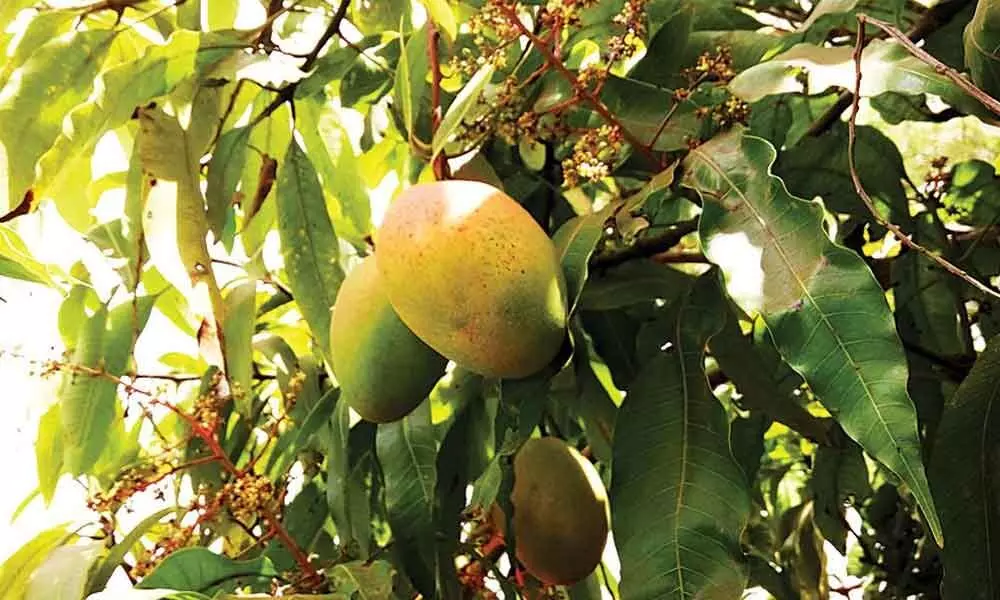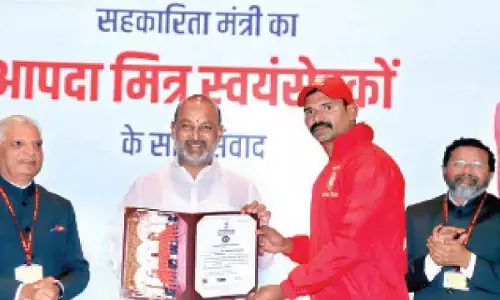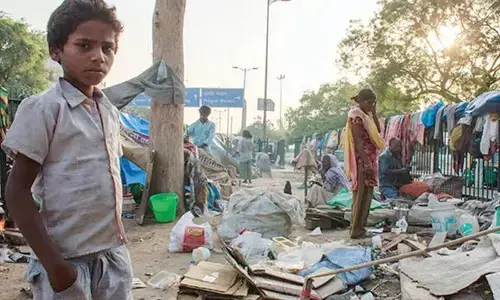Kakinada: Delay in flowering dampens prospects of mango yield

Representational Image
Mango farmers were worried about their crop as there is an abnormal delay in flowering in East Godavari district.
Kakinada: Mango farmers were worried about their crop as there is an abnormal delay in flowering in East Godavari district. The delay in flowering of mango trees may adversely impact the production and also the prices in the coming season.
Owing to incessant rains in October and November last year, mango trees didn't bloom and flower. According to Horticulture department officials, mango fields extend in nearly 13,000 hectares in the district and the delay in flowering may lead to delay in crop. Generally, some of mango varieties like Suvarnarekha, Banginapalli and Rasalu must be completed flowering stage in mid November and December and others like Kotpalli Kobbari, Panduri Mamidi, Totapuri and Rasalu will come to flowering stage during January.
But the rains in October to November last year have disturbed the flowering stage of mango gardens. Due to the delay in flowering, there will be a strong impact on production of mangoes in the coming season. Besides, rain and fog also affected the flowering, which perished. A lot of time will take for the new flowering of mango fruit. However, the second flowering will not sustain the quality of the fruit.
A farmer Nageswar Rao said that they have to spent lot of money for second time flowering.
Horticulture Deputy Director S Ram Mohan told The Hans India that a certain variety of mango could not bloom due to incessant rains in October and November last year. He said farmers are cultivating mango trees in 4,794 hectares in Tuni, 2,566 hectares in Tondangi and 2,650 hectares in Kotananduru and other mandals in the district. He said that at present flowering is 30% for Banganaplli, Suvarnarekha (80%), Panduri Mamidi (60%), Totapuri (50%) and Rasalu (40%). He said that the flowering of the aforesaid mangos would abundantly bloom even after Sankarati. The department officials are creating awareness among the farmers for utilising pesticides and fertilisers. Pesticides are supplied to farmers at subsidy rates in the district, he informed.
A farmer Kanireddy Raju from Tetagunta in Tuni mandal of East Godavari district told The Hans India that usually mango trees would come to flowering stage by January 1. But, only 10 per cent of flowering occurred this time. Due to the delay, both size and quantity of mango can drastically come down and there will be no suitable prices for the crop.
He said that they already incurred great loss due to Covid-19 and informed that he is cultivating mangoes in 50 acres in Tetagunta. Due to pest attack, they couldn't get a higher yield of mango, he added. Raju said that they may get Rs 70,000 to Rs 80,000 after spending Rs 40,000 per acre and couldn't reach the target of Rs 1 lakh. stating that sometimes the ripened mangoes will fall down due to unexpected rains, he added that they may not get higher profits. He said that last year, they sustained a major loss of Rs 6 lakh due to these reasons.
The farmer alleged that the government didn't support mango farmers in any way and also not making any efforts to market their produce even though they provide foreign exchange. Mangos like Banginapilli, Suvarnarekha, Pandirimamidi are exported to China and other countries.
The farmers requested the government to provide transport facilities in strategic places in order to transport their produce to Nuzvid. If the government provides a sub-point between Kathipudi and Tuni mandal of East Godavari district, they will keep their produce at that point. He said that they are facing a lot of difficulties in going to Nuzvid of Krishna district directly.
















